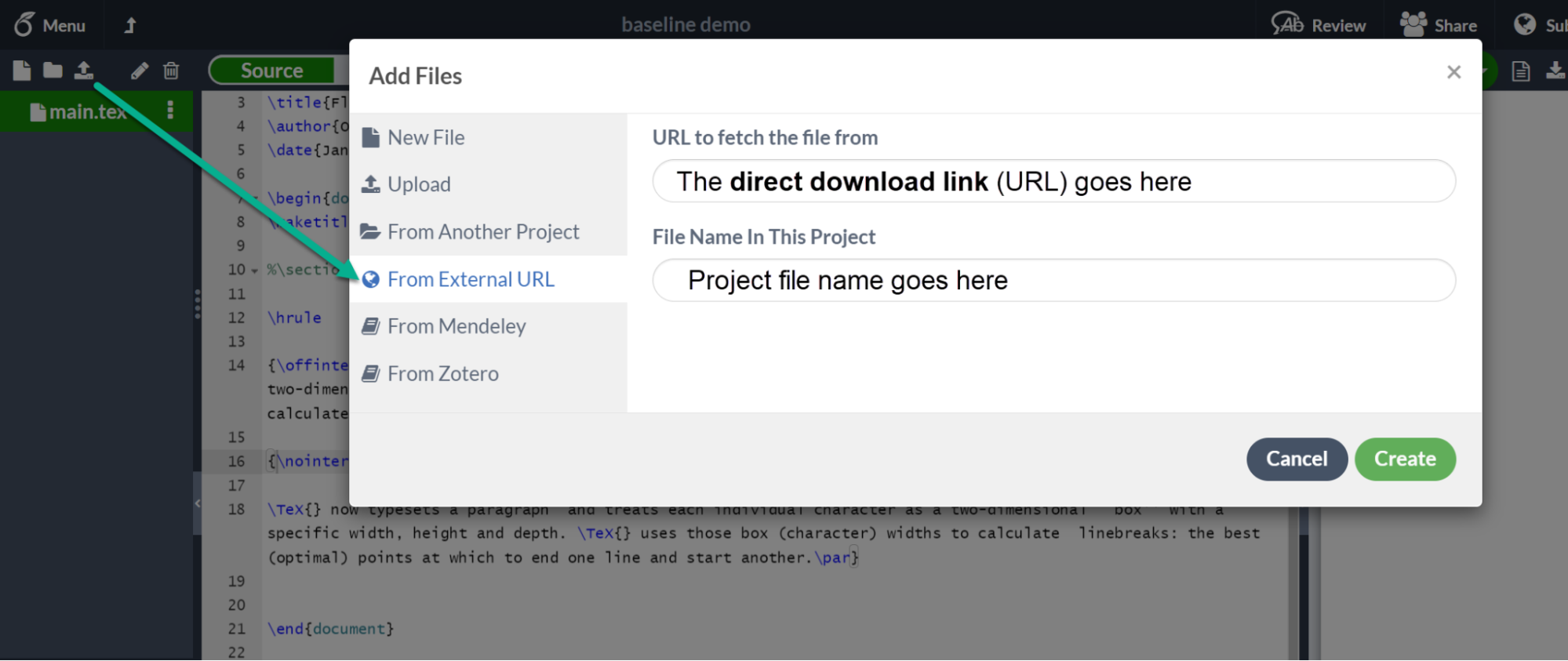How to upload a file using an external URL
Introduction
This article explains how to upload externally hosted files to your Overleaf project using the From External URL feature. We start with a brief introduction to explain file-sharing links and direct download links.
File-sharing links (URLs)
File-hosting services such as Google Drive, Dropbox, OneDrive, and others, enable users to share files securely: creating and providing file-sharing links (URLs) which restrict who can access a particular file and determine the access mode granted: view-only or the ability to edit. Individuals who receive and then select or click a file-sharing link may need to login (authenticate) to the hosting service before they can access the file, or might reach a “landing page” which renders a preview of the file with further links to manually download it.
Direct download links (URLs)
An important type of file link (URL) is the direct download link which enables immediate download of the file without having to authenticate (login) or needing to use an intermediate landing page or other interface: clicking/selecting a direct download link starts the download process.
To use Overleaf’s From External URL feature, file-sharing URLs (links) provided by file-hosting services, such Google Drive, Dropbox or OneDrive, must be converted to a direct download link (a different URL) where the conversion process varies according to the hosting site/cloud service. For example, here are the instructions to create direct download links from Dropbox link-sharing URLs (which were current at the time of writing this article).
Overleaf’s From External URL feature
If you have a direct download link for a particular file, you can use Overleaf’s From External URL feature to upload it into your project.
Start by selecting the file upload icon then choose From External URL:

Provide the link and give the file a name:
- URL to fetch the file from: provide the direct download link (URL) from a file-hosting service such as Google Drive
- File Name in This Project: give a name to the uploaded project file, one which should not include space characters
Google Drive example
The following video demonstrates using a Google Drive direct download link to upload a project file and shows how to refresh the project file if the original was updated or changed on Google Drive.
Notes on converting link-sharing URLs to direct download URLs
Readers are advised of the following points:
- File-hosting services do change the structure of their link-sharing URLs—such as Google Drive security updates. Due to such changes, it’s impractical for Overleaf to provide fully documented URL-conversion processes, because any guidance could become outdated shortly after publication. Readers should find and consult the most current documentation provided by the hosting service(s) they use, or seek out up-to-date articles or YouTube videos.
- Organisations/employers can implement security policies/procedures which prevent creation of direct-download links from URLs used to share the organisation’s files and resources. If you experience difficulties uploading an external file into Overleaf, contact your organisation’s administrator/manager of the file-sharing service to ask about that.
- Readers might wish to check their constructed download links by using an incognito/private browser page to make sure it works without being logged into the file-sharing service.